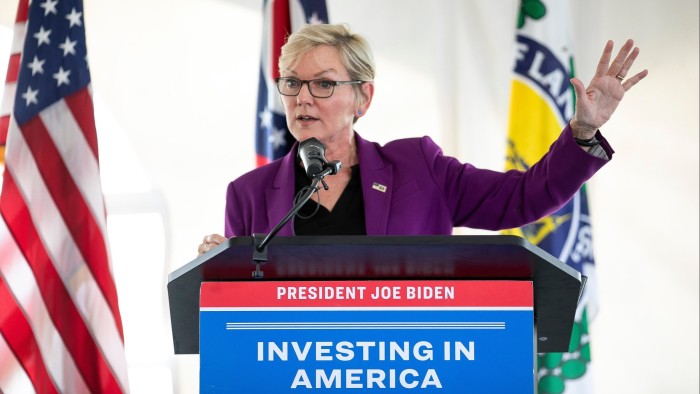Unlock the White House Watch newsletter for free
Your guide to what the 2024 US election means for Washington and the world
The future of America’s natural gas export boom was thrown into doubt after a federal government report found that unbridled expansion would drive up costs for Americans and undermine climate goals.
A long-awaited Department of Energy study released on Wednesday found that the rapid growth of the country’s liquefied natural gas sector might not be in the national interest, setting the stage for sweeping legal challenges that would hinder expansion just as Donald Trump takes office with a pledge to boost exports in pursuit of US energy dominance.
“The main takeaway is that a business as usual approach is neither sustainable nor advisable,” energy secretary Jennifer Granholm said. “Increasing exports unconstrained would surely generate more wealth for the LNG industry. But American consumers and communities, and our climate, would pay the price.”
The report forecast wholesale domestic natural gas prices would surge by as much as 30 per cent and the average American household would pay more than $100 extra annually on their gas bills, said Granholm.
The US LNG industry has grown exponentially since its establishment less than a decade ago, turbocharged in recent years by European demand for American molecules following Russia’s full-scale invasion of Ukraine.
Last year, the US overtook Australia to become the world’s biggest LNG exporter, shipping 11.9bn cubic feet a day — enough to satisfy the combined gas needs of Germany and France. The industry has ambitious plans to double exports by the end of the decade.
But President Joe Biden halted licensing new export terminals in January of this year as his administration carried out a review of the costs and benefits of the boom, prompting a backlash from the oil and gas industry.
The study is likely to be disregarded by Trump, who has vowed to restart licensing on the first day of his second administration. The oil and gas industry has long argued that LNG exports would benefit the climate by weaning the world off coal, the dirtiest fossil fuel.
The American Petroleum Institute, an oil and gas industry lobby group, disputed many of the report’s findings, saying Americans enjoyed among the lowest natural gas prices in the world and the “politically motivated pause” on LNG permits should now be lifted.
But the energy department’s report found direct emissions from the US LNG industry would reach 1.5 gigatonnes annually by 2050 — about a quarter of total current US emissions, according to Granholm. Additional US LNG exports would also displace more renewables than coal globally, she said.
It also said expanding American LNG exports could undermine, rather than boost, domestic energy security, according to Granholm.
Granholm said expanding LNG supply in the years ahead would no longer support close allies such as Europe and Japan, as it has until now, but rather could aid China, a rival.
“Looking ahead, China’s LNG exports are expected to nearly double between now and 2030, and China’s LNG imports are expected to be the highest of any country through 2050,” she said.
Source link









